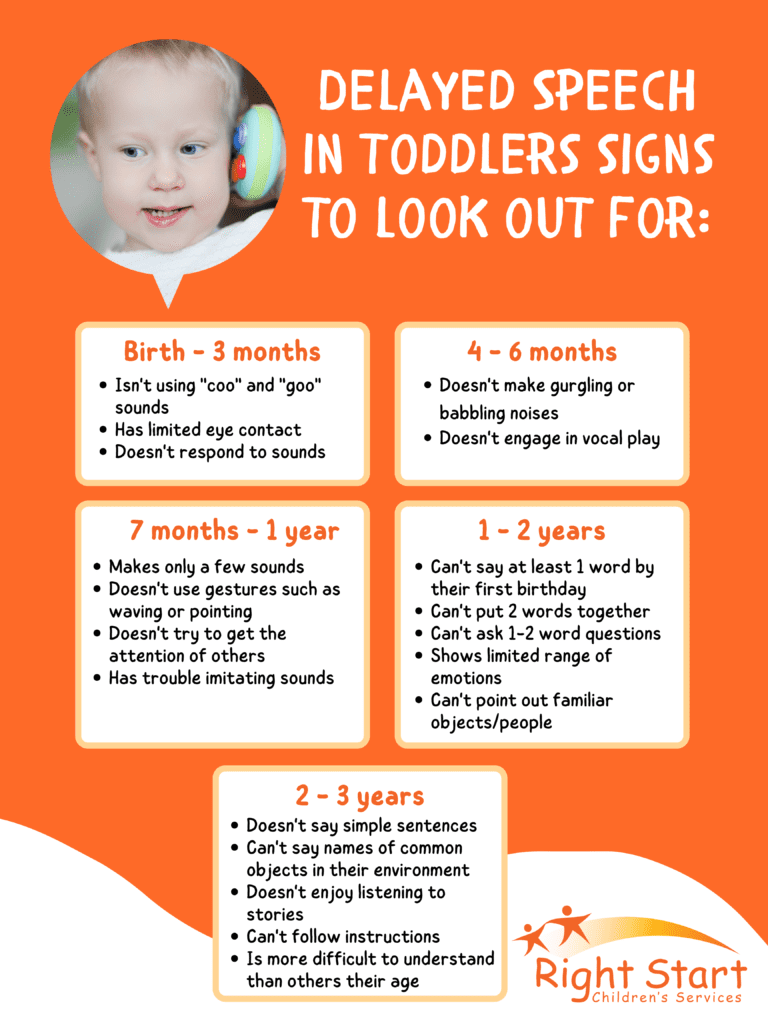Have you ever found yourself wondering, “Did I cause my child’s speech delay?” You’re not alone.
It’s a question many parents wrestle with, often in silence. This concern can create anxiety, guilt, and a whirlwind of worry. But what if the answers you seek are within reach, and the relief you crave is possible? Imagine understanding the factors that contribute to speech delays and discovering ways to support your child’s communication skills effectively.
You can unlock the mystery behind your child’s speech development and empower yourself with knowledge that turns doubt into confidence. Dive into this article to find the answers and reassurance you need, because every parent deserves peace of mind when it comes to their child’s growth.

Credit: askidsblossom.com
Common Causes Of Speech Delay
As a parent, noticing your child’s speech delay can be worrying. You might ask yourself, “Did I cause this?” It’s important to understand that speech delays are often a result of various factors. Recognizing these causes can ease your mind and guide you toward the best solutions. Here, we explore some common causes of speech delay to help you navigate this journey.
Genetic Factors
Genetics can play a significant role in speech development. If you or your partner had speech delays as children, there’s a chance your child might experience something similar. These inherited traits can affect how quickly a child develops language skills. Understanding your family history can provide valuable insight.
Consider discussing these patterns with your pediatrician. They can help determine if your child’s speech delay is linked to genetic factors. It’s not about pointing fingers but gaining clarity on what might be influencing your child’s speech.
Environmental Influences
The environment your child grows up in can impact their speech development. Children need interaction to develop language skills. If a child spends a lot of time in settings where conversation is limited, their speech may develop more slowly.
Think about your daily routines. Are there opportunities for your child to engage in conversations? Simple changes, like reading together or talking during meals, can encourage speech growth. Your proactive efforts make a difference.
Hearing Impairments
Hearing problems can significantly affect speech development. If a child can’t hear sounds clearly, they may struggle to imitate them. Hearing impairments can sometimes go unnoticed, leading to delays in speech.
Regular hearing tests are crucial. They help identify any issues early on, ensuring your child gets the support they need. If your child seems unresponsive to sounds, consider seeking a professional evaluation. Addressing hearing problems can lead to improvements in speech.
Understanding these factors is empowering. It shifts the focus from blame to informed action. Each child’s development path is unique, but being aware of these causes helps you support your child’s growth effectively. What steps will you take to encourage your child’s speech development today?

Credit: www.rightstartservices.com
Parental Concerns And Myths
Parents often worry if they’re responsible for their child’s speech delay. Many myths surround this topic, but experts assure that speech delays often have multiple causes unrelated to parenting. Understanding and support can aid development.
### Parental Concerns and Myths Raising a child often comes with a bundle of questions and worries, especially when it comes to their development. As a parent, you might find yourself asking, “Did I cause my child’s speech delay?” This is a common concern, but it’s important to separate fact from fiction and focus on understanding rather than self-blame. Let’s look into some of the myths and realities surrounding this topic. ###
Debunking Misconceptions
It’s easy to fall into the trap of believing myths about speech delay. One common misconception is that a child’s speech delay is solely due to parental negligence. However, speech development is complex and influenced by many factors, including genetics and individual learning pace. Another myth is that bilingual households cause speech delays. Research shows that children can learn multiple languages simultaneously without any negative impact on their speech development. In fact, bilingualism can enhance cognitive abilities. Consider whether you’ve heard claims like “boys talk later than girls.” While there might be slight differences in development, every child is unique, and these differences are not significant enough to warrant concern without other indicators. ###
Impact Of Parenting Styles
Parenting styles can influence a child’s speech development, but not in the way you might think. Over-correcting or pressuring a child to speak can sometimes create anxiety, which may hinder progress. Instead, fostering a supportive and communicative environment is key. Encouraging conversation and reading together strengthens language skills. Think about how often you engage your child in discussions, even if they are one-sided at first. These interactions are crucial for language development. Reflect on your daily routines. Are there opportunities to introduce new words and concepts naturally? A trip to the grocery store, for example, can become a language lesson by naming fruits and colors. Parenting is a journey filled with learning for both you and your child. By understanding the myths and realities of speech delay, you can better support your child’s unique path to communication.
Role Of Early Childhood Experiences
Early childhood experiences play a crucial role in speech development. These formative years lay the foundation for communication skills. Understanding how interaction and language exposure influence speech can help parents support their child’s development.
Importance Of Interaction
Interaction with caregivers is essential for speech growth. Children learn to communicate by observing and mimicking adults. Conversations stimulate brain development and enhance vocabulary. Simple activities like reading together or talking during playtime encourage language skills.
Social interactions also teach children about tone and emotion. These interactions help children understand the nuances of communication. Playgroups and family gatherings provide opportunities for practice. Engaging with peers can boost confidence in speaking.
Exposure To Language
Language exposure is vital for speech development. Hearing words frequently helps children understand and use them. Diverse vocabulary enriches their language comprehension. Listening to stories or songs introduces new words.
Multilingual environments offer unique benefits. They enhance cognitive flexibility and understanding. Regular exposure to different languages can foster natural speech development. Parents should encourage varied language experiences.
Everyday conversations contribute to a child’s language skills. Simple discussions about daily activities can be very beneficial. These interactions build a child’s ability to express thoughts clearly.

Credit: toddlertalk.com
When To Seek Professional Help
Concern over a child’s speech delay can be overwhelming. Parents often question their role in the delay. Consulting a speech therapist helps identify causes and offers solutions. Early professional help can make a difference in your child’s communication skills.
When it comes to your child’s speech development, concerns may arise. You might wonder if a delay is normal or if professional help is needed. Understanding when to seek assistance can ease your worries. A professional can guide your child through challenges. Recognizing signs early can make a significant difference. ###
Signs Of Concern
Some delays are normal, but specific signs require attention. Does your child have limited vocabulary for their age? Do they struggle to form simple sentences? Is their speech unclear to others? These can be signs of a speech delay. Also, consider if your child shows frustration when trying to communicate. Such frustration might indicate they’re aware of their difficulties. Observing these signs can help you decide on the next steps. ###
Consulting A Speech Therapist
A speech therapist can assess your child’s needs. They provide a professional evaluation of your child’s speech. This assessment identifies areas where help is needed. Therapists use techniques to improve speech and language skills. They tailor strategies to fit your child’s unique needs. Therapy sessions can be engaging and interactive. They often involve games and activities to make learning fun. Regular sessions can lead to significant progress in speech.
Supporting Your Child’s Speech Development
Feeling worried about your child’s speech delay is common. Parents often question if they played a role in it. Understanding speech development helps ease concerns and supports your child’s progress.
Supporting your child’s speech development can feel overwhelming, but it doesn’t have to be. You might wonder if you did something wrong, but it’s important to focus on moving forward positively. Every child grows at their own pace, and there are effective ways to encourage your child’s language skills.
Encouraging Communication
Start by creating a language-rich environment. Talk to your child throughout the day. Describe what you’re doing, what you see, and how you feel. This exposes them to new words and ideas. Ask open-ended questions instead of yes-or-no ones. This invites your child to think and express themselves. For example, instead of asking, “Did you have fun at the park?” try “What did you like about the park?” Make communication fun. Turn conversations into games. You might play a guessing game or make up stories together. This keeps your child engaged and excited about speaking.
Activities To Boost Language Skills
Engage in activities that naturally enhance speech. Reading books together is a great start. Pick colorful picture books with simple text. Point to the pictures and ask your child what they see. Try singing songs or nursery rhymes. Music and rhythm help with memory and pronunciation. You can also watch kid-friendly programs that encourage interaction. Use everyday situations to build vocabulary. Cooking can teach words like “mix” or “pour.” During grocery shopping, introduce names of fruits and vegetables. These activities make learning language part of everyday life. Supporting your child’s speech development is about consistency and encouragement. What small change can you make today to help your child communicate better tomorrow?
Coping With Guilt And Anxiety
Guilt and anxiety often accompany parents of children with speech delays. These feelings can be overwhelming. Parents may question their actions or choices. Understanding these emotions is key to coping. It is crucial to address these feelings head-on. This helps both the parent and the child. Let’s explore ways to manage these emotions effectively.
Understanding Parental Emotions
Parents naturally want the best for their children. So, it’s easy to blame oneself for any challenges. Feeling guilty is a common reaction. It’s important to recognize these feelings are normal. Many parents experience similar emotions. Accepting this can ease the burden of guilt.
Anxiety often follows guilt. Worrying about a child’s future can be distressing. Parents might fear they missed signs of delay. Realizing anxiety doesn’t change the past is helpful. Focus on the present and future steps instead. This mindset can reduce stress and improve mental well-being.
Finding Support Networks
Connecting with other parents can provide comfort. Sharing experiences can make challenges feel less isolating. Support groups offer a safe space to express feelings. They also provide practical advice and encouragement. Online forums and local groups are great resources.
Professional help can also be invaluable. Speech therapists and counselors can offer guidance. They help parents understand their child’s needs better. This support can reduce anxiety and build confidence. Reaching out for help is a strength, not a weakness.
Frequently Asked Questions
Is It The Parents’ Fault For Speech Delay?
Speech delay isn’t always the parents’ fault. Several factors, like genetics and environment, can contribute. Supportive parenting can help. Consult a speech therapist for guidance and intervention. Early intervention often improves outcomes for children with speech delays. Parents play a crucial role, but they are not solely responsible.
Did I Cause My Child’s Language Delay?
Parents usually don’t cause language delays. Various factors contribute, including genetics, hearing issues, or developmental disorders. Early intervention helps improve language skills. Consulting a pediatrician or speech therapist can provide guidance and support tailored to your child’s needs. Be supportive and encourage communication in everyday interactions.
What Is The Root Cause Of Speech Delay?
Speech delay can stem from hearing loss, developmental disorders, or environmental factors. Early intervention is crucial for improvement. Consult a pediatrician or speech therapist for assessment and guidance. Addressing underlying issues helps enhance speech development and communication skills effectively. Encourage interaction and language-rich activities to support growth.
What Is The Number One Cause Of Speech Delay?
Hearing loss is the number one cause of speech delay in children. It can hinder speech and language development. Early detection and intervention are crucial for effective treatment and improvement.
Conclusion
Parents often worry about their child’s speech delay. Blame and guilt are common. It’s crucial to understand you are not alone. Many factors influence speech development. Some are beyond your control. Early intervention can help your child thrive. Seek professional advice and support.
Trust your instincts as a parent. Encourage communication in everyday activities. Read, sing, and talk to your child often. Build a nurturing environment. Patience is key. Progress takes time. Remember, each child is unique. Celebrate small victories. Stay hopeful and positive.
Your love and support make a big difference.

